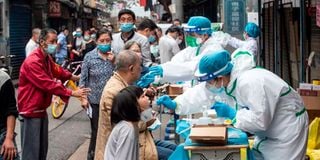Premium
China losing investments on tight Covid lockdowns: Report

Medical workers take swab samples from residents to be tested for the COVID-19 coronavirus, in a street in Wuhan in China.
China may have succeeded in reducing casualties from Covid-19 but a new report says the strict lockdowns are discouraging foreign investments especially from Europe.
The report, published this week by the European Chamber of Commerce in China, a lobby for 1800 companies, says most firms have either slowed down activity in China or are relocating to nearer and friendlier countries to foreign investments.
The European Business in China Position Paper 2022/2023 does say China is still crucial to the world economy, but says Beijing’s own successful policies at dealing with Covid-19 pandemic are ‘isolating’ it from the rest of the world.
“One of the most immediate internal challenges the country faces is justifying its stringent COVID policy at the expense of economic growth and stability,” the document says.
“China operations are also becoming increasingly isolated because staff, both foreign and Chinese, are unable to travel freely to European HQs [headquatres] for regular business exchanges, networking, training and experience/expertise sharing.
“Senior decision-makers from HQs are also being deprived of first-hand China experience, which is resulting in less understanding of—and therefore less desire to engage with—China.”
China, where the first case of Covid-19 was reported in December 2019, embarked on massive lockdowns that cut down the number of deaths. In spite of having the largest population on earth (1.4 billion people), it has reported the one of the fewest Covid deaths per country: 5,226 by Friday.
The lockdowns have continued in spite of vaccines and today, travelling to China is the most expensive of any country as passengers have to keep social distance on flights and are required to quarantine, and have to undergo daily tests once they arrive.
The lockdowns are credited for China’s economic slump in 2022. The Chinese National Bureau of Statistics reported 0.4 per cent growth on year-on-year data to June this years, the lowest since early 2020 at the height of Covid-19.
The ‘Zero Covid’ restrictions have also been blamed for job losses with unemployment rate reaching 19.9 per cent among new college graduates.
The report says Covid-related restrictions have already had a crippling effect on the attraction and retention of foreign and Chinese talent.
With ever-changing visa and work permit procedures, and extreme limitations on travel in and out of China fueling exodus of foreign nationals from the European Union (EU), as well as from countries such as Japan, Korea and the US, that was already underway, it said.
The restrictions, the report says, could cost China at least $22,000 in GDP per capita.
Jörg Wuttke, the President of the European Chamber of Commerce in China said Europe and China “are drifting further and further apart” due to what he called as puzzling Covid restrictions.
“The rest of the world has largely resumed pre-pandemic levels of ‘normality’, but China remains reluctant to open its doors,” he said in a statement appended in the report.
“The country’s ‘splendid isolation’ not only makes travelling in and out tedious, but also by inhibiting people-to-people exchanges—with China’s voice now almost exclusively virtual—it inevitably leads to less understanding of this great nation.
China, the world’s biggest economy, has been a source of products for many countries across the world due to its relatively cheaper manufacturing costs. Now the Chamber says Beijing’s role in global supply chains is facing risks due to “the country's COVID-19 policy, dwindling diversity and increasing politicising of business.”
On Friday, China’s Foreign Ministry Spokesman Wang Wenbin defended China’s zero-policy, arguing it has helped the world recover, and that Beijing provides suitable environment for foreign investors.
“In a world still struggling to fight the pandemic and lift the global economy, China has both brought COVID under control and achieved social and economic progress. When all things are considered, China’s COVID measures have worked best and been most cost-effective,” said Wang at a regular press conference on Thursday.
While Wang said European investments to China have been the highest of all foreign, an earlier analysis by New York research firm Rhodium had also suggested that EU and UK investments in new factories had dropped to $2 billion in the first half of 2022 from $4.8 in the same period last year.



